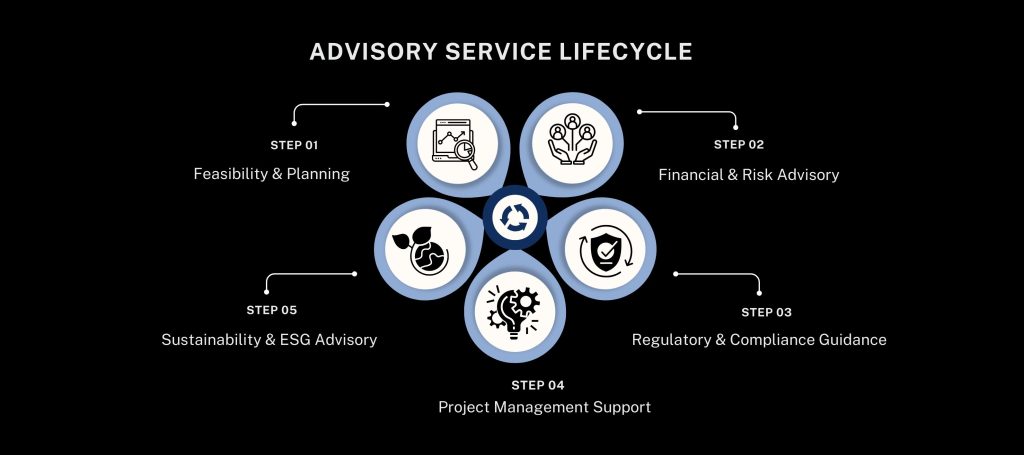Infrastructure is the backbone of economic growth and sustainable development. From transport networks to utilities, from digital systems to energy, the demand for well-planned, resilient, and future-ready infrastructure is increasing at an unprecedented pace. Organizations and governments often struggle to balance technical complexity, regulatory compliance, financial viability, and environmental sustainability. This is where consulting advisory services play a pivotal role in guiding decision-makers.
Understanding Advisory Services in Infrastructure Consulting
At its core, consulting advisory services in infrastructure revolve around helping clients design, evaluate, and implement projects with a long-term, strategic focus. Unlike execution services that focus primarily on construction or operational delivery, advisory services are positioned at the intersection of strategy, finance, engineering, and governance.
The primary aim is to:
- Assess project feasibility and risks.
- Optimize financing structures.
- Ensure compliance with regulatory and environmental frameworks.
- Deliver sustainable, cost-efficient solutions aligned with stakeholder goals.
Key Components of Consulting Advisory Services
The scope of consulting advisory services in infrastructure extends across several domains. Some of the most critical include:
1. Strategic Planning and Policy Advisory
Infrastructure projects must align with national and regional policies, long-term urban development goals, and global sustainability commitments. Advisory teams provide guidance on:
- Master planning for smart cities and transport systems.
- Policy alignment with climate and energy targets.
- Prioritization of projects based on economic and social impact.
2. Feasibility Studies and Risk Analysis
Every infrastructure project involves technical, financial, and environmental risks. Consulting advisory experts assess:
- Engineering feasibility and design optimization.
- Environmental and social impact assessments (ESIA).
- Risk identification, quantification, and mitigation strategies.
Market demand analysis and capacity forecasting.
3. Financial and Commercial Structuring
One of the most valuable aspects of advisory is in project finance. Advisors help structure Public-Private Partnerships (PPPs), attract investors, and secure funding. Services include:
- Developing financial models and sensitivity analyses.
- Structuring PPP agreements and concession frameworks.
- Advising on project bankability and investor engagement.

4. Regulatory and Compliance Advisory
Infrastructure development often requires navigating a complex legal environment. Consulting advisory teams provide:
- Guidance on environmental regulations, permits, and approvals.
- Compliance with international standards (IFRS, ESG, ISO).
- Legal structuring of contracts and procurement processes.
5. Digital Transformation and Smart Infrastructure
With the rise of digital infrastructure, advisory services now encompass:
- Integration of IoT, AI, and data analytics in asset management.
- Cybersecurity frameworks for critical infrastructure.
- Transition planning for smart grids, intelligent transport, and digital twins.
Technical Dimensions in Advisory Services
The scope of consulting advisory is deeply technical. Advisors are expected to integrate engineering expertise with strategic insight. Some technical areas include:
- Project lifecycle management: Covering conception, design, implementation, and operations.
- Asset management frameworks: Optimizing lifecycle costs and maximizing return on investment (ROI).
- Sustainability metrics: Incorporating carbon accounting, renewable integration, and green certifications.
- Resilience planning: Designing infrastructure capable of withstanding climate change, disasters, and geopolitical disruptions.
Value Creation Through Infrastructure Consulting Advisory
The tangible benefits of engaging in consulting advisory services extend far beyond compliance and financing. They provide:
- Risk Reduction – By identifying technical and financial pitfalls early.
- Cost Optimization – Through efficient resource allocation and smart procurement.
- Enhanced Governance – Ensuring accountability and transparency across stakeholders.
- Future-Proofing Assets – Building sustainable and resilient infrastructure aligned with long-term needs.
For governments, this means achieving developmental goals with fiscal prudence. For private players, it translates into higher investor confidence and competitive advantage.
Global Trends Shaping Advisory Services
The scope of consulting advisory services is constantly evolving. Current global trends shaping infrastructure consulting include:
- Green and Sustainable Infrastructure: Net-zero commitments are driving advisory services to prioritize renewable energy, eco-friendly materials, and circular economy models.
- Digital Infrastructure: Demand for 5G networks, data centers, and smart utilities is reshaping advisory priorities.
- Urbanization and Smart Cities: Rapid urban growth requires integrated transport, housing, and digital solutions.
- Resilience Against Climate Change: Advisory services are now central in embedding resilience frameworks into design and finance models.
The Expanding Scope for the Future
Looking ahead, the demand for consulting advisory services in infrastructure will only intensify. Governments are increasing capital expenditure on infrastructure, while private players are seeking partnerships in large-scale projects. With climate change, technological disruption, and urbanization driving complexity, advisory will expand into areas such as:
- Green finance advisory for sustainable bonds and climate funds.
- Advanced analytics for predictive maintenance and operational efficiency.
- Integration of blockchain in procurement and project governance.
- Advisory for energy transition projects like hydrogen, offshore wind, and carbon capture.
Conclusion
The scope of consulting advisory services in infrastructure consulting is vast, spanning strategy, finance, engineering, compliance, and technology. By guiding stakeholders through complex decisions, these services ensure that infrastructure projects are not only feasible but also sustainable, resilient, and future-ready.
In an era where infrastructure is the foundation of competitiveness and quality of life, the role of consulting advisory has never been more critical. It is not just about building assets—it is about creating value, enabling growth, and shaping the future of communities.









